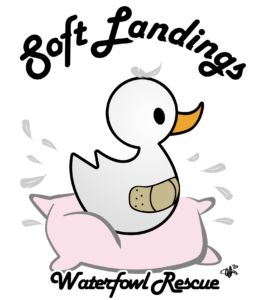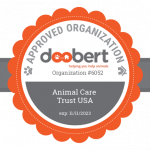 This week, on All My Children Wear Fur Coats, Melanie Simmonds offered expert advice on raising waterfowl and explained why domestic ducks should never be abandoned at a pond.
This week, on All My Children Wear Fur Coats, Melanie Simmonds offered expert advice on raising waterfowl and explained why domestic ducks should never be abandoned at a pond.
Melanie Simmonds is the director of Soft Landings Waterfowl Rescue, a nonprofit corporation committed to rescuing and rehoming abandoned domestic waterfowl, as well as providing care and sanctuary for those with special needs. After reading the poignant passage “Postcard from Your Duck,” Melanie was inspired to volunteer at her local duck rescue, Feathered Angels Waterfowl Sanctuary. She quickly fell in love with the ducks, taking over the operation with her husband Mark in 2019, and rebranding it as Soft Landings.
Melanie revealed the complexities of caring for waterfowl with special needs. She emphasized the importance of recognizing each duck’s unique personality and preferences. She explained that while some disabled ducks thrive with 3D-printed orthotics, others prefer the comfort of padding over artificial devices. Trial and error are required to determine what each duck is willing to tolerate.
Domestic waterfowl differ from their wild counterparts in ways that make them less suited to survive in nature. Melanie described the traits selectively bred into ducks for agricultural purposes, such as larger size, vibrant colors, and the inability to fly. Unfortunately, domestic ducks often end up abandoned by their owners. According to Melanie, many individuals purchase young ducklings on an impulse, only to release them once they grow larger and are more challenging to care for. Though these owners may have good intentions, thinking they are “setting them free,” domestic waterfowl are defenseless and ill-equipped to survive in the wild. Since they cannot fly, they are highly vulnerable to predators such as raccoons, coyotes, and stray dogs.
Melanie listed some necessities for responsible waterfowl ownership. Anyone wishing to keep ducks should ensure they have access to clean water and a predator-proof enclosure, fortified with buried, cloth-covered wire to protect against burrowing animals. Owners should be prepared for ducks to produce large amounts of waste and create mudholes. It’s also important to recognize that duck ownership is a long-term commitment, as waterfowl can live for over a decade in a captive environment. Melanie highlighted the importance of providing a proper nutritional diet, noting that many of Soft Landings’ ducks are disabled due to being deprived of essential nutrients during their early stages as ducklings.
As with most rescue organizations, volunteers play a crucial role in Soft Landings’ success. Melanie encouraged listeners to connect with their local waterfowl rescue to learn how they can help make a difference.
If you would like to learn more about Soft Landings Waterfowl Rescue, please visit SoftLandingsTN.com. Follow Soft Landings on social media at Facebook.com/SoftLandingsTN and Instagram.com/SoftLandingsTN.
Make sure to protect your pet’s future with a Pet Trust! Visit ACT4Pets.org to learn more!


